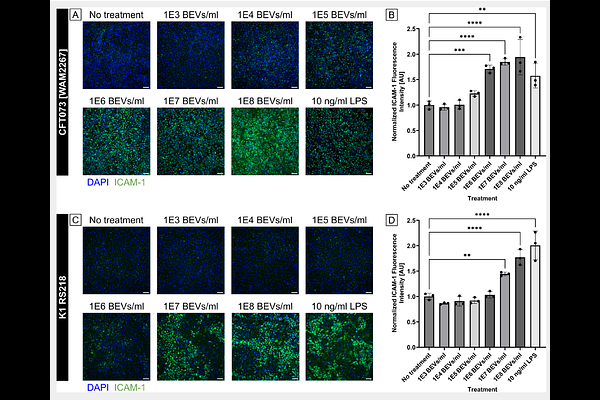Antibiotic treatment modulates Escherichia coli-derived bacterial extracellular vesicle (BEV) production and their capacity to upregulate ICAM-1 in human endothelial cells

Antibiotic treatment modulates Escherichia coli-derived bacterial extracellular vesicle (BEV) production and their capacity to upregulate ICAM-1 in human endothelial cells
Widom, L. P.; Torabian, P.; Wojehowski, A. C.; Ghaemmaghami, S.; Michel, L. V.; Gaborski, T. R.
AbstractAntibiotic treatment is often necessary in order to eliminate life-threatening bacterial infections. However, these treatments may result in altered production of bacterial extracellular vesicles (BEVs), which often contain biomolecules that can promote inflammation. In this study, we examined how the clinically-relevant antibiotics meropenem, tobramycin, and ciprofloxacin impacted BEV production from a urinary tract infection-associated Escherichia coli strain (CFT073 [WAM2267]) and a meningitis-associated strain (K1 RS218). We discovered that BEVs from both strains caused a dose-dependent increase in expression of intercellular adhesion molecule-1 in human umbilical vein endothelial cells, priming the endothelium for interactions with immune cells. By blocking toll-like receptor 4 (TLR4), we demonstrated that this receptor was responsible for BEV-endothelial interactions. Treatment with meropenem, a {beta}-lactam antibiotic, resulted in increased production of BEVs from strain K1 RS218. Furthermore, meropenem treatment caused strain CFT073 [WAM2267] to produce BEVs with heightened pro-inflammatory capacity, possibly by amplifying the content of lipoprotein Lpp in these BEVs as measured by mass spectrometry. These results may inform clinicians about the risks of treatment with certain antibiotics against specific strains of E. coli and also indicate TLR4 as a potential therapeutic target to reduce BEV-mediated endothelial inflammation during infection.